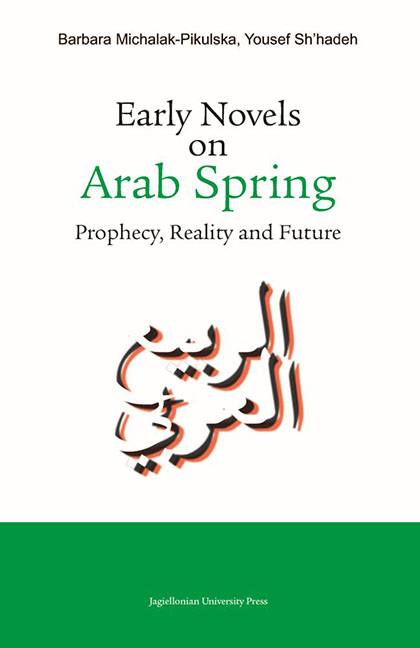Book contents
- Frontmatter
- Contents
- Introduction
- Part I Awakening of the Awareness of Subjugation – The Prophecy of the Spring of Nations in Arab Novels
- Part II At the Heart of the Arab Spring Events
- Part III The Future: The Spring Continues
- 17 Mu‘Taṣim Aš - Šā‘Ir : Uhzūǧat ar-raḥīl (A Song of Departure) and Fī intiẓār as-sulaḥfāt (Waiting for a Turtle)
- 18 Aḥmad ‘Abd Al - Malik : Al-Aqni‘a (Masks)
- 19 Ṭayba Aš - Šarīf Al - Idrīsī : Ḥaǧar min saqar (A Stone from Hell)
- 20 Amīra Aš - Širbīnī : ‘Itq (Liberation)
- 21 ‘ Izz Ad - Dīn Šukrī Fašīr : Bāb al-ẖurūǧ – risālat ‘Alī al-muf‘ama bi-bahǧa ġayr mutawaqqa‘a (The Gate to Leave – Ali’s Letter Filled with Unexpected Joy)
- Conclusion
- Bibliography
- Summary in Arabic
17 - Mu‘Taṣim Aš - Šā‘Ir : Uhzūǧat ar-raḥīl (A Song of Departure) and Fī intiẓār as-sulaḥfāt (Waiting for a Turtle)
Published online by Cambridge University Press: 13 October 2023
- Frontmatter
- Contents
- Introduction
- Part I Awakening of the Awareness of Subjugation – The Prophecy of the Spring of Nations in Arab Novels
- Part II At the Heart of the Arab Spring Events
- Part III The Future: The Spring Continues
- 17 Mu‘Taṣim Aš - Šā‘Ir : Uhzūǧat ar-raḥīl (A Song of Departure) and Fī intiẓār as-sulaḥfāt (Waiting for a Turtle)
- 18 Aḥmad ‘Abd Al - Malik : Al-Aqni‘a (Masks)
- 19 Ṭayba Aš - Šarīf Al - Idrīsī : Ḥaǧar min saqar (A Stone from Hell)
- 20 Amīra Aš - Širbīnī : ‘Itq (Liberation)
- 21 ‘ Izz Ad - Dīn Šukrī Fašīr : Bāb al-ẖurūǧ – risālat ‘Alī al-muf‘ama bi-bahǧa ġayr mutawaqqa‘a (The Gate to Leave – Ali’s Letter Filled with Unexpected Joy)
- Conclusion
- Bibliography
- Summary in Arabic
Summary
The novels Uhzūǧat ar-raḥīl (A Song of Departure) and Fī intiẓār as-sulaḥfāt (Waiting for a Turtle) by Mu‘taṣim aš-Šā‘ir represent politically and socially engaged works. The writer describes tragic events and stories, he is a witness to his times, who tries to analyze the relationship between the citizen and the totalitarian system. He believes that one should not blur the difference between good and evil nor justify violence and injustice. He warns leaders that it is impossible to completely falsify history and then escape punishment.
The first novel Uhzūǧat ar-raḥīl by this Sudanese writer is filled with concern for the future of the Arab world. The author shares his reflections on the future of the young generation, participating in the events of the Arab Spring, being its main driving force. These young people possess enthusiasm and optimism which is a huge force that can change the world. They refuse to accept the surrounding reality – the regime and omnipresent corruption – and they dream of change and a better future for themselves and their families.
The novel is the story of a young Arab who, on the one hand, complains about the bad situation in the country, but on the other feels that nothing can be done to improve it. These dilemmas lead him to be institutionalized in a psychiatric hospital, but the doctor examining him is surprised by the fact that the patient is aware of his illness and knows exactly what kind of therapy he needs. His rebellion is a rebellion of Arabs, participants in the Arab Spring, which opens the way to healing and solving problems. The novel is self-referential, as the narrator talks about himself, sharing his reflections on various topics related to his difficult life situation. The author uses metaphors and symbols, an example of which would be the story of a man who enters a swamp in the dark, followed by a child whom he kills by uttering the word that Gaddafi used to refer to the revolutionaries who fought against him: rat. This insult and the description of the man as the “King of kings” clearly indicates that the author has Muammar Gaddafi in mind.
- Type
- Chapter
- Information
- Early Novels on Arab SpringProphecy, Reality and Future, pp. 122 - 124Publisher: Jagiellonian University PressPrint publication year: 2022



